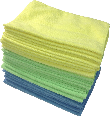Removing Household Allergens
Written by Lee Wyatt (last updated March 15, 2021)
The sneezing, sniffling, coughing, and complaining of hay fever season seems to increase in direct proportion to how little snow there is on the ground. Interestingly enough, it doesn't matter if you are inside the home or outside, if you are susceptible to hay fever or allergies then you understand the pain and frustration that comes at this time of year.
The air quality of the home can directly affect a person's hay fever and allergies. Instead of spending yet another year suffering through the headaches, watery eyes, and other symptoms of an allergy attack, take a few steps to remove household allergens.
- Filters. One of the best ways to get rid of allergens in the home is through the use of filters. Not just a regular filter, though. You will want to use a High Efficiency Particulate Arrestance (HEPA) filter to help purify your air. These filters can clean up to 99.97% of the allergens or particulates in the air of your home.
- Linens. Regularly changing the linens in your home will help reduce and remove the allergens in your home. This doesn't just mean your bed linens, but such things as any furniture coverings, draperies, curtains, and so on. This will also reduce the amount of dust in your home.
- Dust. Dust is probably one of the most common home allergens. Take the time to dust your furniture, no less than once a week, to help reduce the buildup of dust in your home. It only stands to reason that if it's not there, it can't really bother you, can it?
- Vacuum. It's not just tabletops, countertops, and other furniture items that collect dust. Regularly vacuuming your floor will help remove any dust buildup in the same manner as when you dust your furniture. When you vacuum your floors, though, make sure that you use a vacuum cleaner that has a decent filter, otherwise you will be doing nothing more than simply pushing dust all over the place.
- Odors. Smells can also affect our allergies, and therefore taking steps to help eliminate strong odors and smells is going to help limit the chances of an allergy attack. Eliminate any offensive odors that may be lingering in your home, while at the same time limiting the use of strong fragrances. Aromatherapy can also help you in this regard, but be sure that you experiment to see which fragrances work the best for you.
Author Bio
Lee Wyatt
Contributor of numerous Tips.Net articles, Lee Wyatt is quickly becoming a regular "Jack of all trades." He is currently an independent contractor specializing in writing and editing. Contact him today for all of your writing and editing needs! Click here to contact. Learn more about Lee...
Designing Your Own Closets
A common dream for homeowners is to have their very own custom closets. While it would be wonderful to be able to hire ...
Discover More
Roasting Meat Correctly
Sometimes recipes have the nasty habit of saying "Cook your meat for this long, and serve." But what do you do if you ...
Discover More
Protecting Painted Floors
Painting floors has long been a method for protecting them from damage and dirt, and other forms of wear and tear. ...
Discover More
Removing Kitchen Odors
The kitchen is one of those areas of the home that, if you are not very careful, can easily end up generating all kinds ...
Discover More
Cleaning Air Conditioning Filters
Cleaning air conditioning filters is a fairly easy, though often overlooked, piece of home maintenance and cleaning. By ...
Discover More
Improving Home Air Quality
Whether it is during the height of allergy season or in the dead of winter, the air quality in your home is important. ...
Discover More

Comments